1,071 news posts

Environment
13 Apr 2023
Coral-eating fish poo may act as ‘probiotics’ for reefs
by Angharad Brewer Gillham, Frontiers science writer Image/Shutterstock.com Coral-eating fish are thought to weaken coral reefs because they consume coral tissue, whereas grazer fish are assumed to have positive effects because they eat algae that compete with corals. However, a new study shows that feces from coral-eating fish contain bacteria that can be beneficial to corals. On the other hand, feces from grazers contain high levels of pathogens that can kill corals. Until recently, fish that eat coral — corallivores — were thought to weaken reef structures, while fish that consume algae and detritus — grazers — were thought to keep reefs healthy. But scientists have discovered that feces from grazers leave large lesions on coral, possibly because they contain coral pathogens. By contrast, feces from corallivores may provide a source of beneficial microbes that help coral thrive. “Corallivorous fish are generally regarded as harmful because they bite the corals,” said Dr Carsten Grupstra of Rice University, lead author of the study published in Frontiers in Marine Science. “But it turns out that this doesn’t tell the whole story. Corallivore feces contain many of the bacterial taxa that associate with healthy corals under normal conditions, potentially resulting in the natural […]

Frontiers news
12 Apr 2023
Parul Kumar appointed as Frontiers’ chief operating officer to drive operational excellence
Research publisher Frontiers appoints Parul Kumar as chief operations officer. Parul, who brings more than twenty-three years’ experience to the position, will primarily focus on internal processes and the operational model of the company, including governance, organization, policies, procedures, and optimization. Photo credit: Frontiers Parul joins Frontiers from the London Stock Exchange Group, where she was the Group Head of Operational Excellence driving business process transformation & organizational effectiveness. She has also successfully held leadership roles at GSK, Expedia, UCB Pharmaceuticals, e-Bay, and General Electric leading business change, transformation, customer experience and culture shift in fast paced and high growth environments. She is passionate about diversity and inclusion, creating collaborative working cultures supporting children and women in science, technology, engineering, art, and mathematics initiatives. Frontiers’ co-founder and chief executive officer Kamila Markram says, “Parul’s support in advancing Frontiers’ mission, as she joins us as a member of the executive leadership team, will contribute to driving the growth and success of our company. She is an outstanding leader with global expertise, a track record of driving process excellence, organizational change transformation, and building customer centric organizations and teams.” Commenting on her appointment, Parul Kumar adds, “I am excited to be joining Frontiers […]
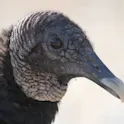
Featured news
12 Apr 2023
Most plastic eaten by city vultures comes straight from food outlets
By Mischa Dijkstra, Frontiers science writer Black vultures, Coragyps atratus, in the US. Image credit: Hannah Partridge Researchers have shown that black and turkey vultures in US urban areas get most of the plastic they ingest from nearby food stores and restaurants. They often seem to eat plastic unintentionally, risking their health, but in some cases may do so on purpose to induce vomiting up of other undigested foods. Since the 1950s, humanity has produced an estimated 8.3bn tons of plastic, adding a further 380m tons to this amount each year. Only 9% of this gets recycled. The inevitable result is that plastic is everywhere, from the depths of the oceans to the summit of Everest – and notoriously, inside the tissues of humans and other organisms. The long-term effects of ingested plastic on people aren’t yet known. But in rodents, ingested microplastics can impair the function of the liver, intestines, and exocrine and reproductive organs. Especially at risk of ingesting plastic are scavenging birds. For example, New World vultures regularly forage at landfills, and have been observed to leisurely pick at synthetic materials such as boat seats, rubber seals, or roofs. Read original article Download original article (PDF) Now, […]

Featured news
06 Apr 2023
Obstructive sleep apnea may directly cause early cognitive decline
By Mischa Dijkstra, Frontiers science writer Obstructive sleep apnea is a debilitating disease, which can lead to fragmented and poor sleep and daytime sleepiness Patients with obstructive sleep apnea (OSA) often show cognitive deficits, but these have traditionally been attributed to co-morbidities. But now researchers have shown for the first time that OSA itself is sufficient to cause early cognitive decline in middle-aged non-obese men. Obstructive sleep apnea (OSA) is a potentially dangerous condition. During sleep, the throat muscles of people with OSA relax and block the airflow into the lungs, so that they repeatedly stop breathing. Common symptoms of OSA include restless sleep, loud snoring, daytime sleepiness, and prolonged headaches in the morning – highly debilitating for patients and their partners. OSA is currently underdiagnosed: it may occur in as much as 15-30% of men and 10-15% of women, or approximately 1bn adults worldwide, of whom an estimated 80% don’t know they have it. Major risk factors for OSA include middle or old age, being obese, smoking, chronic nasal blockage, high blood pressure, and being male. Now, researchers from the UK, Germany, and Australia have shown for the first time that in middle-aged men, OSA can also cause early […]

Climate action
05 Apr 2023
How a city walk may improve your mood: Here are five Frontiers articles you won’t want to miss
By Deborah Pirchner, Frontiers science writer Image: Shutterstock.com At Frontiers, we bring some of the world’s best research to a global audience. But with tens of thousands of articles published each year, it’s impossible to cover all of them. Here are just five amazing papers you may have missed. Walking in the city might be just as good for our mood as walking in nature Time spent in urban environments is associated with depletion of cognitive resources and an increasing prevalence of mental illness. Few studies, however, have measured working memory capacity. Now, writing in Frontiers in Psychology, US researchers have compared memory performance and self-reported mood before and after a 30-minute walk in a natural or urban environment. The scientists assigned participants to either a nature or an urban condition and measured differences in self-reported affect and OPSAN, a complex measure of working memory capacity, before and after going on a walk in the respective environment. Their results showed that regardless of the setting, walkers exhibited an increase in positive affect and a decrease in negative affect, suggesting that going outside for a walk can boost mood regardless of environment type. They found, however, no significant changes in working memory […]
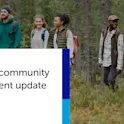
Frontiers news
04 Apr 2023
Frontiers community engagement update – spring 2023
We take a moment to reflect on the information, resources, and actions taken over the past several months towards promoting longer, more prosperous lives on a healthier planet. Photo credit: Frontiers Women in Science Now in its third year, our Women in Science blog continues to serve as a platform to give women researchers a voice within their communities. It is a place for them to share their career progressions and achievements in their respective disciplines, speak about the challenges on the way, while also sharing advice for future generations of researchers. This year, the blog is highlighting the contributions these women make to the United Nations Sustainability Development Goals. Over the past several months, readers have explored playful pedagogies within the context of global education (SDG 4), health equity and women’s health (SDG 5), evolutionary biology and the conservation of amphibians (SDG 15), and accessibility to clean water as part of sustainable agriculture (SDG 6). Frontiers’ Volunteers The year began with a review of the impact Frontons had made through their volunteer efforts over the course of 2022. The thinking globally, acting locally blog post took a closer look at how our colleagues contributed to their local communities around […]

Earth science
04 Apr 2023
New low-cost camera could help scientists forecast volcano eruptions affecting millions
By Deborah Pirchner, Frontiers science writer Image: Shutterstock.com Monitoring emissions from volcanoes – particularly sulfur dioxide (SO2) using specialized cameras – is important for hazard forecasting. Gathering long-term time series datasets is critical because volcanoes can exhibit significant changes in activity over time. Now, researchers have developed a cheap and low-power SO2 camera suited for long-term measuring. The tool could have significant implications for millions of people worldwide who live close to active volcanoes, they say. Gas emissions are the manifestation of activity occurring beneath the surface of a volcano. Measuring them lets researchers see what can’t be seen from the surface. This knowledge is vital for hazard monitoring and the prediction of future eruptions. Since the mid-2000s, ultraviolet SO2 cameras have become important tools to measure emissions. The measurement campaigns, however, must be accompanied by a user, making SO2 cameras unsuitable for acquiring long-term datasets. Building and operating this type of camera can cost upwards of $20,000, resulting in very few cameras being installed permanently. To get better long-term monitoring data, an international team of researchers has developed an SO2 camera to continually measure emission rates from volcanoes. They have now published an article about the camera design and two […]
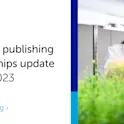
Frontiers news
31 Mar 2023
Frontiers publishing partnerships update – spring 2023
The latest news on our collaborations with scholarly societies. Welcome from Robyn Mugridge, Head of Publishing Partnerships As our community of publishing partners grows, we are pleased to welcome you to our new Frontiers publishing partnerships quarterly round-up. Here you will find news of newly agreed partnerships and upcoming events as well as the latest updates on our program. 2022 was an important year for publishing partnerships at Frontiers: our partner journals published a total of 831 articles overall submissions to partner journals increased by 66% we maintained an average decision time of 67 days. Frontiers has now moved more than 16,000 partner journal articles to our open access platform – significantly contributing to our mission of making science accessible. 2023 is set to be another exciting year for our publishing partnerships and we look forward to marking further milestones in the coming months. Credit: Frontiers Celebrating partners: our first case study We have published our first partner case study focused on our longstanding partner journal Pathology and Oncology Reviews (POR). Looking in detail at POR’s journey to open access, the case study celebrates the journal’s achievements and explores its aspirations for the future. Are special issues the key to […]

Frontiers news
30 Mar 2023
Biomedical Research Center of the Slovak Academy of Sciences signs publishing agreement with Frontiers
The journal Acta Virologica will move to gold open access publisher Frontiers in April, as part of an agreement signed by the Institute of Virology from the Biomedical Research Center of the Slovak Academy of Sciences (BMC SAS). Credit: Frontiers The agreement is Frontiers’ first publishing partnership in Slovakia and marks an important step forward for open access in the field of virology. Commenting on the agreement, Dr. Silvia Pastorekova, director general of BMC SAS, said: “We are excited to partner with Frontiers and bring Acta Virologica to a wider audience. Frontiers’ commitment to open access and innovative publishing solutions help us achieve our mission of advancing virology research and improving global health.” Acta Virologica is an international journal focusing mainly on molecular and cellular virology, publishing fundamental research related to human, animal and plant viruses. Areas of interest range from the morphology of viruses to vaccines and antiviral drugs. Established in 1957, the journal was previously published under a hybrid model by AEPress. Acta Virologica will open for submissions on Frontiers’ fully open access platform in spring 2023. Robyn Mugridge, head of publishing partnerships at Frontiers, commented: ‘We look forward to partnering with BMC SAS for the transition of Acta […]

Featured news
30 Mar 2023
Babies’ gut microbiome not influenced by mothers’ vaginal microbiome composition
By Deborah Pirchner, Frontiers science writer Image: Shutterstock.com Alterations in babies’ gut microbiomes during early life are commonly associated with negative health outcomes later on, including asthma and obesity. Gut microbiome alterations are frequently attributed to how a baby is delivered (birth mode). This gave ground to practices like vaginal seeding, aiming to expose babies born via C-section to their mother’s vaginal microbiome. Canadian researchers have examined this supposed interplay between infant microbiome composition and birth mode and found that mothers’ vaginal microbiome composition does not affect microbiome development of babies. It has been a longstanding assumption that birth mode and associated exposure of newborns to their mothers’ vaginal microbiome during delivery greatly affects the development of babies’ gut microbiome. To test the scientific validity of this assumption, a team of Canadian researchers has now published a study in Frontiers in Cellular and Infection Microbiology in which they examined the effect of maternal vaginal microbiome composition on the development of infants’ stool microbiome at 10 days and three months after birth. “We show that the composition of the maternal vaginal microbiome does not substantially influence the infant stool microbiome in early life,” said Dr Deborah Money, a professor of obstetrics […]
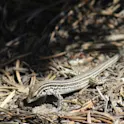
Environment
29 Mar 2023
Lizards at US Army installation are stress eating during flyovers
By Mischa Dijkstra, Frontiers science writer Colorado checkered whiptail, Aspidoscelis neotesselata. Image credit: Carina Kusaka Scientists studied the response of an uncommon asexual lizard, the Colorado checkered whiptail, to anthropogenic noise at the military installation Fort Carson. They compared the lizard’s behavior between dates with and without flyovers by military aircraft. On flyover dates, the lizards showed a physiological stress response and spent more time eating and less time moving. These results suggest that the lizards deal with noise pollution by eating more to maintain the energy levels. Lizards may be small, with only a single hearing bonelet compared to our three, and without earflaps, but their hearing is typically good. Most lizards can hear frequencies between 100 and 5,000 Hz (although they are most sensitive between 400 and 1,500 Hz), compared to between 20 and 20,000 Hz in humans. So how do lizards react to noise pollution? Here, scientists studied the impact of noise from low-flying military aircraft on the behavior and well-being of an uncommon lizard, the Colorado checkered whiptail (Aspidoscelis neotesselatus). This was done at the Fort Carson US military Installation near Colorado Springs, where Apache, Chinook, and Blackhawk helicopters regularly fly over, and occasionally transport aircraft […]

Engineering
27 Mar 2023
Shh! Intensive care incubators resonate sounds and risk damage to premature babies’ hearing, scientists say
by Angharad Brewer Gillham, Frontiers science writer Image/Shutterstock.com Although the effects of a noisy environment in the neonatal intensive care unit have been studied before, the effect of the incubators premature babies spend their first weeks or even months in has not. A team of scientists investigated, and found that while the incubators dampen some sounds, they amplify others, potentially damaging babies’ hearing. For vulnerable premature babies, an incubator in the neonatal intensive care unit (NICU) is a lifesaver, but the consequences can last a lifetime. Many studies have shown that the NICU is a noisy environment and that babies who spend time there have higher rates of hearing impairment, which can lead to delays in language acquisition. Scientists from Vienna, Hamburg, Munich, and Osnabruck set out to investigate the role of the incubator, an underestimated element in the soundscape that surrounds babies during their time in the NICU. “The motivation of our multidisciplinary research team concerns the question: why many more premature babies suffer hearing impairments,” said Dr Christoph Reuter from the University of Vienna, corresponding author of the study published in Frontiers in Pediatrics. “We believe that what we have measured in our studies could be a leading […]
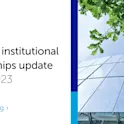
Frontiers news
24 Mar 2023
Frontiers institutional partnerships update – spring 2023
The latest news on our collaborations with research institutions, libraries, consortia, and funders. Welcome from Frank Hellwig, Institutional Partnerships Development Manager The first months of 2023 brought several key additions to our community of institutional partners. Through these new partnerships, as well as through our longstanding relationships with many other institutions, we are pleased to be able to support a growing number of researchers, librarians, and consortiums in the global transition to open access. As of spring this year, we are happy to report that more than 650 institutions worldwide now benefit from partnership agreements with Frontiers. We look forward to welcoming more partners throughout the year, and, as our community grows, we will continue to work to better understand the preferences and needs of institutions and researchers. New partnership announcements We have announced several new partnerships and renewals over recent months. World Economic Forum Frontiers has entered into a new partnership with the World Economic Forum (WEF). As part of the new agreement, Frontiers will join the WEF’s Centre for New Society and Economy and champion open science across the network. Norway national deal Norway renewed its national agreement with Frontiers. The deal, which covers 36 institutions and research […]
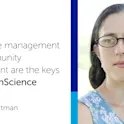
Frontiers news
24 Mar 2023
Rachel Schattman – Sustainable management & community engagement are the keys
Author: Rafa Tasnim Dr Rachel E Schattman is an Assistant Professor of Sustainable Agriculture at the University of Maine School of Food and Agriculture, where she leads a group of graduate students and staff scientists in the Agroecology Lab. She is also a fellow with The George J Mitchell Center for Sustainability Solutions and an associate of the University of Maine Climate Change Institute. Previously, Rachel served as a postdoctoral researcher at the United States Department of Agriculture Northeast Climate Hub, where her work focused on climate change and adaptation from agricultural perspectives, as well as designing curricula for adult learners. In this blog post, we will discuss accessibility to clean water and sanitation as part of the United Nations Sustainable Development Goal 6 through the lens of Rachel’s research expertise and perspectives on sustainable agriculture and climate change. Photo credit: Karrah Kwasnik What encouraged you to work towards sustainability, more specifically on climate change issues and sustainable agriculture? “I believe that climate change is the biggest threat to human and non-human communities and ecosystems around the world, and that the danger it poses to our ability to grow food is worthy of our close attention. I did not start […]

Featured news
24 Mar 2023
Frontiers’ Volunteers: February’s friendly competitions for good
Frontons wasted no time when it came to jumping back into volunteer activities at the start of the new year, even challenging colleagues to join them in doing good with some friendly competition. This month, we talk to journal launch specialist and Sustainability Network launch team member Hannah Kulmatycki and portfolio manager and production team member Vikki Davies about the challenges to start off 2023. Photo credit: Frontiers February Fashion Detox Frontiers’ Sustainability Network is an employee-run, volunteer-based initiative aimed at encouraging sustainable practices at both the individual and corporate level. Led by Frontons from across various departments, the network brings awareness to key issues that everyone faces and advocates for choices in line with Frontiers’ larger mission for enabling healthy lives on a healthy planet. The Sustainability Network organizes regular activities throughout the year, such as a guest speaker series, environmentally conscious events, and a monthly newsletter with helpful resources. The decision to hold a challenge at the beginning of the year took into consideration the factors many people face at this time of year. Photo credit: Marie Bubloz “We had just hosted our first speaker series event of 2023 on doughnut economics and the circular economy featuring Zohar […]